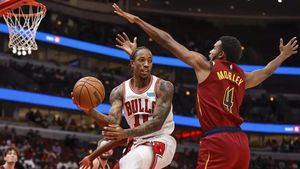Pope Francis's health shows slight improvement following his hospitalization due to double pneumonia, with the Vatican reporting on February 20th, on the sixth day of his stay at Rome's Gemelli Hospital, "the Holy Father’s clinical condition is improving slightly." He is currently free of fever and maintaining stable hemodynamic parameters, which indicate he is responding positively to treatment for his respiratory ailment.
On February 14, at the age of 88, the pope was admitted to the hospital with breathing difficulties which rapidly escalated to double pneumonia. This condition is particularly concerning for Francis, as he has experienced lung issues prior, including the partial removal of one lung during his youth due to recurrent pulmonary infections.
The latest bulletin released by the Vatican mentions no episodes of respiratory crisis since the recent reports of his condition. The Vatican stated, "Even today there were no episodes of asthmatic respiratory attacks; some laboratory tests have improved." This was welcomed news as it follows days where doctors expressed caution about his prognosis due to the complexity of his condition.
Pope Francis continues to receive oxygen therapy but has shown improvement, prompting the medical team to adjust his treatment regimen cautiously. They noted the absence of concerning complications such as renal failure, indicating the treatments have begun to take effect.
On February 19, the pope had received the Eucharist and intermittently engaged with his duties, working on texts and receiving visits from officials. Cardinal Juan José Omella expressed optimism about the pope's recovery, noting, "With the medical bulletins the Vatican is putting out, everyone needs to start studying medicine. But the first lesson, I’d say, is the pope is doing well." His comments reflect the general sentiment surrounding the pope's health, where each update brings relief to many.
Despite signs of improvement, speculation about the potential for resignation remains. Cardinal Gianfranco Ravasi indicated, "If he were in a situation where his ability to have direct contact... was compromised, then I think he might decide to resign," acknowledging the importance of communication for the pope's role. Nonetheless, cardinals like Jean-Marc Aveline have stressed the need for prayers, with Aveline stating, "The pope is a fighter... what has matured... he applies it, whatever the obstacles." This implies confidence not only in Francis's leadership but also reflects the prayers being said worldwide for his recovery.
The Vatican has organized nightly prayers, led by Cardinal Pietro Parolin, drawing together cardinals, church officials, and Roman Catholics to recite the Rosary in support of Pope Francis. This initiative highlights the collective hope and faith within the Catholic community. A Vatican source indicated, "Pope Francis thanked all God’s people who gathered to pray for his health over the recent days," showcasing his appreciation for the outpouring of support.
Pope Francis's health condition has sparked worldwide concern, particularly as he has been hospitalized multiple times throughout his tenure. Prayers have surged globally, with many feeling the need for his presence during tumultuous times. Jesuit theologian Antonio Spadaro commented on this sentiment, saying there were "many genuinely concerned... because they know Francis is one of the few who is able to connect the dots in our divided world." This comments resonate with the acknowledgments around the pope’s pivotal role within the church and broader society.
During this time, Francis has used his hospital room as a means to connect with others, calling the pastor of the Holy Family Parish in Gaza recently to express his paternal connection. He humorously noted upon meeting with Italian Prime Minister Giorgia Meloni, "Some prayed the pope would be taken to Heaven, but the Lord of the harvest decided to leave me here awhile.” His light-hearted remark reassures many of his resilience amid serious health challenges.
While the Vatican remains cautiously optimistic, the complexity of Pope Francis's medical condition means doctors will continue to monitor his progress and adjust treatment as necessary. Until more definitive information is available, they urge continued prayers and support for the pontiff. The community sentiment reflects hope and faith as they rally behind their leader during this challenging time, with everyday activities like the evening Rosary serving as communal expressions of solidarity.



